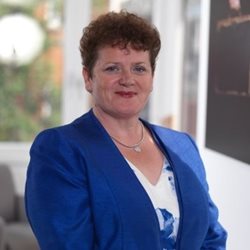
Sue O’Brien OBE
Founding partner at Ridgeway Partners and experienced NED and charity trustee
You can listen to Sue’s story in full on podcast here or search ‘Women on Boards Success Stories’ in all major apps:
Adapting your approach to different business types
Many of us consider which organisations to target by market sector. Whether a company is a retailer, a consultancy or an online creative business is often a determining factor to whether our executive skills will be in use. But like many headhunters, Sue O’Brien frames the choice between types of organisation based on business structure – whether FTSE-listed, founder-led or charity sector. And whilst the advice is often to stick to one type of company, Sue has experience working with all three.
Sue’s ability to adapt her approach to different contexts has been embedded from early on in her career. She has moved from management in Sainsburys’, to a growing travel firm then into executive search in her executive career. “It’s your attitude to work which is so important,” Sue considers. She credits her mother with instilling a drive to take all opportunities and her three elder siblings with requiring she developed ‘blind faith’ in her ability to achieve.
Sue is also clear in articulating her approach and what it can bring. “I like solving problems,” Sue explains. For example, she looks at recruitment in a different light to most. “It’s like a rubrics cube where you need to get all the pieces aligned,”
“The match needs to fit for the company’s various needs. But also to work for the candidate and where they are in their life – as it’s bigger than just your career.”
However, Sue found she needed to resist her instincts as a ‘problem fixer’ in her first non-executive role at Kids Out charity, which gives respite breaks to children in challenging situations. “As a non-executive your role is to be provocative, but in a positive way,” she explains. “It’s a shift from being a CEO, where you can just ask people to do things. It’s for the executive team ultimately to work out the solution.”
She has been able to apply her skills and approach to other very different organisations. Her business strategy and recruitment skills helped a founder-run pottery business bring on the people it needed to expand. The learning for her was in how a founder-run company operates and the emotions involved.
Sue also found her ability to cut to the heart of the issue was beneficial in her Chair role at Breast Cancer Campaign’s Unlock the Cure advisory board. The research charity faced a major challenge in the sharing of tissue samples and research across the medical research community. Her business networks and problem-solving approach helped crystallise that it was a commercial IT solution that was needed, rather than scientific innovation, and the resulting system is now facilitating significant advances.
Being very clear about her approach and what she can bring has been key to opening up opportunities for Sue. She credits one of her previous mentors with helping her identify her strengths and preferred way of working. Sue also recommends considering moving to different sectors or business models where your skill set may be more in demand. “A consumer retailer is likely to have many candidates with customer experience. But in the finance world, this could be your USP,” she suggests.
